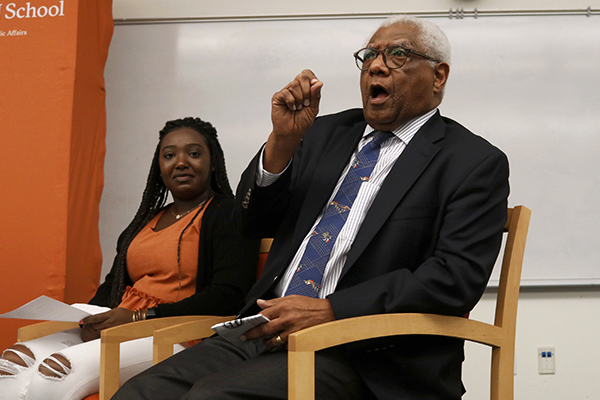The Policy Alliance for Communities of Color organized a panel to discuss Barbara Jordan’s roots, her accomplishments and her impact on the civil rights movement Tuesday. Jordan, who was the first African American congresswoman from the Deep South, taught in the Lyndon B. Johnson School of Public Affairs from 1979 to 1996.
The alliance works within the LBJ School to promote awareness and understanding of policy issues affecting communities of color, according to the LBJ School’s website. The discussion was part of the 23rd annual Barbara Jordan Week, which celebrates the Texan congresswoman’s life and legacy said Joel Carter, a global policy studies graduate student.
The discussion was led by Peniel Joseph, public affairs and history professor, and public affairs professor Edwin Dorn, and moderated by the alliance executive board members Azeem Edwin and Barbara Kufiadan. Following the discussion, the audience was able to ask questions.
“She is, in a lot of ways, exemplary of a kind of active reimagining of race, class and gender and sexuality identities,” Joseph said. “She’s a trailblazer, and (it’s important to) find out the movement that birthed her but also that she helped to shape.”
Carter was on the committee to plan the week and said this year’s theme — “We the People” — was inspired by Barbara Jordan’s statements during the 1974 Watergate scandal.
“We really wanted to choose a quote from Barbara that really spoke to (inclusion),” Carter said. “In the 1974 Watergate scandal, Jordan had testified, and her opening statement spoke to that notion of how she felt left out when the Constitution was created. Through a process of amendment interpretation she, and other people that look like her, have finally been included.”
The alliance’s upcoming events for Barbara Jordan Week include a panel on the history of Black land ownership and a keynote on her legacy.
About 35 people attended the event, including Brit Havey DeWitt, a public affairs graduate student. She said Jordan’s faith in the constitution and effort to build consensus across party lines inspired her.
“Barbara Jordan exemplified qualities that politics today desperately need,” DeWitt said. “She saw diversity as a strength, both racial and ethnic diversity, as well as political differences. I feel like we’ve moved very far away from those things today, where it feels like we’re more partisan and siloed than ever.”




















